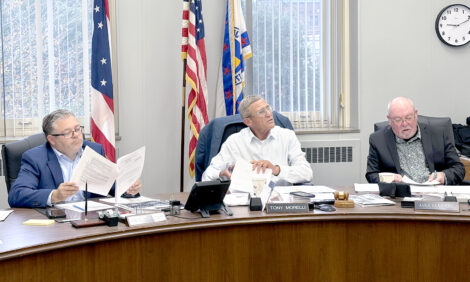Public charter schools to allow for religious vaccine exemptions
CHARLESTON — In-person and virtual public charter schools will continue to follow Gov. Patrick Morrisey’s executive order allowing for religious exemptions to required school-age immunizations until the matter is settled.
During its regular virtual meeting Thursday morning, the Professional Charter School Board heard from its own legal counsel and Morrisey’s legal counsel regarding whether to follow state Board of Education guidance requiring public school systems to abide by existing State Code that mandates immunizations for students entering public and private schools except in cases of a medical exemption, or to follow Morrisey’s January executive order allowing for a religious exemption.
But PCSB Director Adam Paul said until the state’s courts weigh in, he will continue to provide guidance to public charter schools to exempt any student from the required immunizations if their parents submit a letter from the state Department of Health approving an exemption.
“I provided informal guidance to the schools about this matter after the Governor’s executive order in January, and this was at a time where our guidance was the same as the state Board of Education,” Paul said. “The existing guidance that we’ve provided is that…the only students that charter schools may enroll without evidence of proper vaccinations are those who have an exemption letter from the Bureau of Public Health. If the student does have that letter, then he or she must be admitted.”
State Code requires children attending school to show proof of immunization for diphtheria, pertussis, tetanus, polio, measles, mumps, rubella, varicella and hepatitis B unless proof of a medical exemption can be shown. But Morrisey signed Executive Order 7-25 on Jan. 14, citing the 2023 Equal Protection for Religion Act to allow for religious and conscientious objections to the state’s school vaccination mandates.
“The Governor feels very strongly that EPRA shouldn’t be ignored and should be enforced as it’s written on his face,” said Sean Whelen, general counsel for Morrisey. “He’s asking for your support in applying the law as written. Now we have multiple courts sort of interpreting and understanding that law correctly…I think when ERPA is applied as it’s written and when it’s enforced, it requires the religious exemptions to compulsory vaccination that Department of Health provides.”
The executive order required the commissioner for the Bureau of Public Health/state health officer to establish a process for parents/guardians to request religious or philosophical exemptions to school-age vaccines, only requiring a request in writing from the parent/guardian. The Governor’s Office released guidance in May to schools and parents seeking vaccine exemptions.
However, the state Board of Education voted in June to require State Superintendent of Schools Michele Blatt to issue guidance to county school systems that they follow the current compulsory school vaccination law that does not permit religious exemptions for students. An effort to pass a law during the 2025 legislative session earlier this year to allow for a religious vaccine exemption died in the House of Delegates.
“We have advised the Professional Charter School Board…that they need to take the side of the state Board of Education and change their recommendation to require charter schools to comply with the vaccine mandate and to not allow for exceptions for religious objections,” said Assistant Attorney General John “Jack” Willems. “It’s not just standing with the state Board of Education. It’s also standing with the Legislature, which has rejected carving out a religious exemption to the compulsory vaccination mandate.”
Two state lawsuits have already been ruled on by local courts. One case filed by the ACLU-WV and Mountain State Justice seeking an order to require the state Department of Health to follow the existing vaccine law was dismissed on technical grounds. A Raleigh County lawsuit seeking an injunction to stop the local and state boards of education from enforcing the state vaccine law was approved for three parents. The state board is considering an appeal of that lawsuit to the West Virginia Supreme Court of Appeals.
The PCSB was created by the Legislature in 2021 to authorize the creation of in-person public charter schools, statewide virtual charter schools, and county-level virtual charter schools. Since its creation, the PCSB has approved five in-person public charter schools and two statewide virtual charter schools. Schools created by the PCSB – whose members are appointed by the governor – only fall under state Board of Education supervision when it comes to accountability and student performance.



